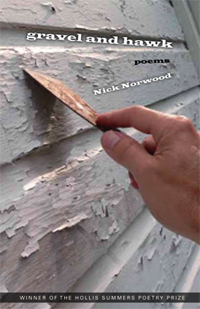Nick Norwood’s Gravel and Hawk
 Gravel and Hawk
Gravel and Hawk
by Nick Norwood
Ohio University Press, 2012
72 pages / $16.95 Buy from Ohio University Press or Amazon
The traditional story of the south: barns, fields, dilapidated gas stations, grandparents, a keen sense of rhythm, and a pronounced attention to the detail of these things. Family stories filled with fairly controlled amounts of emotion and longing and romanticism. Qualities like these flare in Nick Norwood’s latest collection, Gravel and Hawk, out from Ohio University Press. It’s a book of family and most certainly of place. The moving lens of the speaker hovers over these components for various amounts of time and in various patterns, chopping up the focus so that the southern tale might not get too long-winded.
Norwood uses his focus on the South to expose the relationship between people and place throughout the collection. At least, the opportunities are there and some exposure is developed. He constructs a short sequence near the middle of the book simply called “Buildings,” in which various buildings around this hometown are examined in various lights. Some focus on the items lying around the place while others describe past events on the property, memories and injuries. I’m reminded right away during the first of these poems, called “Filling Station,” of — obviously — the Elizabeth Bishop poem of the same name. While Norwood’s gas station has some beautiful imagery, such as the opening line “The dirt driveway is potbelly black, / jeweled with bottle caps and broken glass,” the poem doesn’t do what Bishop’s does so well: connect the place with its people. And in a collection so focused on the people and family of the South, it seems to me more importance should be applied to this connection.
Later in the same sequence, a poem titled “Field Shed” does accomplish this connection, and it does it well. Here the farmer walks among the many still and silent dangers sitting in the shed. “He walks in a vapor, drags it like a mean spirit / a half step behind. Where he stops it hovers. / His father’s harness hangs on the wall.” The man now has a past, a father, has concerns and threats, “mean spirits,” and all these things that a place can and should bring to its residents. Finally we have connections. Finally we have the South.
February 4th, 2013 / 12:00 pm
